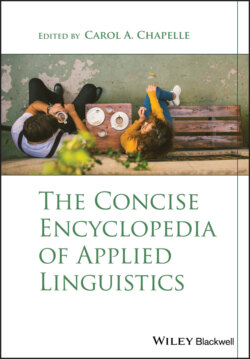Читать книгу The Concise Encyclopedia of Applied Linguistics - Carol A. Chapelle - Страница 224
B Bilingualism and Cognition
ОглавлениеANNETTE M. B. DE GROOT
Scientific interest in the effects of (individual) bilingualism on cognition dates back to at least the first quarter of the 20th century, as illustrated by two early articles on the relation between bilingualism and mental development (Smith, 1923) and between bilingualism and intelligence (Saer, 1923). In addition to engaging scientists, the question of whether and how bilingualism affects cognition also concerns policy makers, educators, and parents of bilingual families. The widespread interest in this topic presumably stems from the desire to create circumstances that foster beneficial effects of bilingualism on cognitive functioning while at the same time preventing any adverse effects bilingualism might have. In one domain of cognition, namely, language representation and use, the influence of bilingualism is ubiquitous, affecting all components of the language system, but there is also plenty of evidence to suggest that bilingualism also affects nonlinguistic cognitive domains. In this entry the influence of bilingualism on both language (verbal cognition) and some aspects of nonverbal cognition is discussed.
